Malcolm R. Campbell's Blog, page 45
September 7, 2022
I had to mow the yard because I couldn’t find the house–or the cat
I think we’ve had rain for 10000000 days. When it’s not raining, the grass is too wet to mow, and/or the flu we’ve been fighting has kept us inside. I finally cut the grass after supper last night because I wasn’t sure whether I was coming home to my house or a neighbor’s house. Plus, when the cat went outside, he disappeared into the pasture primeaeval.
 The grass was not only higher than the cat, it was higher than the mower. Dark clouds were rolling in. Vicious lightning owned the horizon off to the east. I had to move quickly or darkness would swallow the world and I’d run into the black Angus cattle in the adjoining pasture. (Before the farmer put in a new fence, the cattle got out on numerous occasions at night. I could hear them in the yard, but couldn’t see them. When cattle get out, the whole community comes out to round them up.)
The grass was not only higher than the cat, it was higher than the mower. Dark clouds were rolling in. Vicious lightning owned the horizon off to the east. I had to move quickly or darkness would swallow the world and I’d run into the black Angus cattle in the adjoining pasture. (Before the farmer put in a new fence, the cattle got out on numerous occasions at night. I could hear them in the yard, but couldn’t see them. When cattle get out, the whole community comes out to round them up.)
The riding mower really wasn’t built for grass this high. Seriously, tall fescue needs a tractor with a bush hog. We used to have one, but the bush hog was shot and the tractor was old, so we sold it off. The mower stalled out numerous times and gulped gas faster than a sailor swigs beer on liberty. So, I ran out of gas before I got done and had to tow the mower back to the garage with my Buick about the time the rain hit.
In the light of day this morning, the yard looks like the cut grass is piled up and ready to bale. At least the house is visible from the road and doesn’t look like an abandoned homestead. I’m getting too old for this kind of crap. At least I had the presence of mind to put the cat in the house and to use the mower’s headlights in case any cows got in the yard. None did, but they raised a ruckus on the other side of the fence.
Frankly, I think it’s about time to hire a landscaping company and hope they show up for work.
–Malcolm
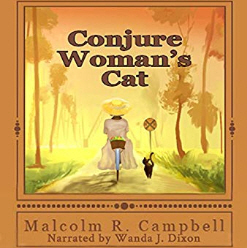 Malcolm R. Campbell grew up in the Florida Panhandle and sets his stories there.
Malcolm R. Campbell grew up in the Florida Panhandle and sets his stories there.
“Wanda J. Dixon’s warmth and gorgeous singing voice are superb in this story about Conjure Woman Eulalie, which is told through the voice of her cat and spirit companion, Lena. Dixon zestfully portrays Eulalie, who is “older than dirt” and is kept busy casting spells, mixing potions, and advising people–that is, when the “sleeping” sign is removed from her door. Most distinctive is Eulalie’s recurring sigh, which conveys her frustration with Florida in the 1950s, when Jim Crow laws and “Colored Only” signs were routine. Dixon’s Lena is fully believable when she spies around town and reports to Eulalie that rednecks have raped and murdered a young woman. They almost escape until Eulalie persuades a witness to come forward. Listeners will marvel at the magical realism in this story and benefit from the helpful glossary of the charming local dialect. S.G.B. Winner of AudioFile Earphones Award © AudioFile 2016″
September 6, 2022
Peter Straub (1943-2022) – Locus Online
“Author Peter Straub, 79, died September 4, 2022 after a long illness. Straub was a celebrated, influential, and bestselling author of literary horror, dark fantasy, and psychological thrillers. Peter Francis Straub was born March 2, 1943 in Milwaukee WI. He earned a BA in English from the University of Wisconsin in 1965, an MA from Columbia University in 1966, then returned to Wisconsin to teach English at his former prep school for three years. In 1969 he moved to Ireland and began work on a PhD at University College in Dublin, but did not finish. He published two books of poetry in 1972, Ishmael and Open Air, and his first mainstream novel, Marriages, in 1973.”
Source: Peter Straub (1943-2022) – Locus Online
Sad news for fans of Straub’s gothic and other dark fiction. Here are his novels, compliments of Wikipeia:
Novels[1973: Marriages1974: Under Venus1975: Julia 1977: If You Could See Me Now 1979: Ghost Story 1980: Shadowland (World Fantasy Award nominee, 1981)[11]1983: Floating Dragon (winner of the 1984 August Derleth Award)[12]1984: The Talisman (with Stephen King, winner of the 1985 World and Locus Fantasy Awards)[13]1988: Koko (winner of the 1989 World Fantasy Award)[14]1990: Mystery 1993: The Throat (winner of the 1993 Bram Stoker Award[15] and 1994 WFA nominee[16])1995: The Hellfire Club (1996 Bram Stoker[17] and 1997 August Derleth Awards nominee[18])1999: Mr. X (winner of the 1999 Bram Stoker Award[19] and August Derleth Award nominee[20])2001: Black House (with Stephen King, 2001 Bram Stoker Award nominee)[20]2003: Lost Boy, Lost Girl (winner of the 2003 Bram Stoker Award[21] and 2004 August Derleth Award nominee[22])2004: In the Night Room (winner of the 2004 Bram Stoker Award)[22]2010: A Dark Matter (winner of the 2010 Bram Stoker Award)[23]We will miss his dark words.
–Malcolm
September 4, 2022
Duck Soup Labor Day weekend
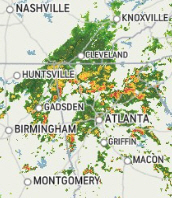 Our wet weather continues in NW Georgia as our county and the county north of us have gotten ten inches of rain in twelve hours. And there’s more to come. I’m glad we live on a hill, though I expect one of our roads into town is flooded. So much for my plan to pick up a few groceries today. (My wife ordered me not to leave the house!)
Our wet weather continues in NW Georgia as our county and the county north of us have gotten ten inches of rain in twelve hours. And there’s more to come. I’m glad we live on a hill, though I expect one of our roads into town is flooded. So much for my plan to pick up a few groceries today. (My wife ordered me not to leave the house!) The nearby horse rescue farm (Sunkissed Acres) north of us has experienced a lot of flooding. Their access to the barn has been cut off. The images on their Facebook page are sad and disturbing. A four-foot-high fence is completely underwater. Today’s volunteers have been turned away for their own safety. If you’re not already using the “Smile” feature on Amazon to send donations to a charity for each book you purchase, Sunkissed Acres can use your help.
The nearby horse rescue farm (Sunkissed Acres) north of us has experienced a lot of flooding. Their access to the barn has been cut off. The images on their Facebook page are sad and disturbing. A four-foot-high fence is completely underwater. Today’s volunteers have been turned away for their own safety. If you’re not already using the “Smile” feature on Amazon to send donations to a charity for each book you purchase, Sunkissed Acres can use your help.
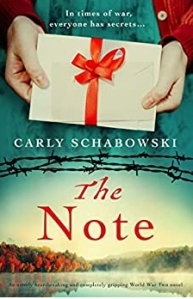 This is a good weekend for that cauldron of chili I made yesterday and a stack of cool books to read. Carly Schabowski, the author of the bittersweet novel The Rainbow, which I just finished, has an interesting new WWII novel out, The Note. I’m tempted to put it on my reading list. The publisher’s description starts out this way: “Auschwitz, 1942. Adeline and Jozef cling to each other as they are directed off the train and pulled apart by Nazi guards at the gates of Auschwitz. Stripped of their belongings, their arms are inked with prison numbers. In the death camp, their days are numbered––will they ever see each other again?”
This is a good weekend for that cauldron of chili I made yesterday and a stack of cool books to read. Carly Schabowski, the author of the bittersweet novel The Rainbow, which I just finished, has an interesting new WWII novel out, The Note. I’m tempted to put it on my reading list. The publisher’s description starts out this way: “Auschwitz, 1942. Adeline and Jozef cling to each other as they are directed off the train and pulled apart by Nazi guards at the gates of Auschwitz. Stripped of their belongings, their arms are inked with prison numbers. In the death camp, their days are numbered––will they ever see each other again?” As for the current war, Oliver Bullough, in “Beyond the fog of war: books to help us understand the invasion of Ukraine,” (The Guardian) has a few ideas “from Ukrainian history to Putin’s kleptocracy and Gogol’s stories.” He writes, “with Russian forces pushing deep into Ukraine, bombarding Kharkiv, Kyiv and other cities, and an unprecedented wave of western sanctions pushing the rouble down to an all-time low, it is hard for any of us to tear our eyes away from the news. But the currents of history that led up to this crisis are deep and complex, and understood in profoundly different ways in Moscow and Kyiv.”
As for the current war, Oliver Bullough, in “Beyond the fog of war: books to help us understand the invasion of Ukraine,” (The Guardian) has a few ideas “from Ukrainian history to Putin’s kleptocracy and Gogol’s stories.” He writes, “with Russian forces pushing deep into Ukraine, bombarding Kharkiv, Kyiv and other cities, and an unprecedented wave of western sanctions pushing the rouble down to an all-time low, it is hard for any of us to tear our eyes away from the news. But the currents of history that led up to this crisis are deep and complex, and understood in profoundly different ways in Moscow and Kyiv.” If it’s dry where you live, I hope you have a great Labor Day weekend experiencing high-quality outdoor activities that don’t include soggy picnics or lightning-charred steaks on the grill. If it’s not dry, have fun reading and watching old movies on TV. (Yesterday, my wife and I stumbled into a “Starwars” marathon somewhere out there on DISH and now don’t know what planet we’re living on–if it’s Tatooine, things ought to be dryer outside than they are.)
If it’s dry where you live, I hope you have a great Labor Day weekend experiencing high-quality outdoor activities that don’t include soggy picnics or lightning-charred steaks on the grill. If it’s not dry, have fun reading and watching old movies on TV. (Yesterday, my wife and I stumbled into a “Starwars” marathon somewhere out there on DISH and now don’t know what planet we’re living on–if it’s Tatooine, things ought to be dryer outside than they are.)
September 1, 2022
‘The Rainbow’ by Carly Schabowski
The Rainbow (2021) brings readers one of the many “smaller” and more personal stories of bravery and loss and old secrets behind the larger headlines from Germany’s World War II invasion and brutal occupation of Poland. In the process, we learn some history we never knew and are all the better for it.
From the Publisher:
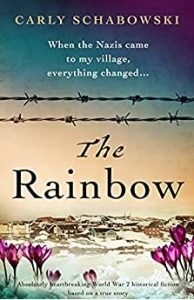 “Nazi-occupied Poland, 1940. When soldiers drag Tomasz back to his family’s farm, they put a gun to his head and tell him he must join the German army, or see his loved ones forced into the camps. Staring into the wide blue eyes of his childhood sweetheart Zofia, Tomasz does the only thing he can. Over the course of the war, he will risk his life, love and the respect of his own people, to secretly fight for good against evil. All the while, he longs to be reunited with Zofia… but will his brave choices tear them apart forever?
“Nazi-occupied Poland, 1940. When soldiers drag Tomasz back to his family’s farm, they put a gun to his head and tell him he must join the German army, or see his loved ones forced into the camps. Staring into the wide blue eyes of his childhood sweetheart Zofia, Tomasz does the only thing he can. Over the course of the war, he will risk his life, love and the respect of his own people, to secretly fight for good against evil. All the while, he longs to be reunited with Zofia… but will his brave choices tear them apart forever?
“London, present day. Isla has grown up wearing her grandfather’s rainbow scarf, a beloved memento from the Second World War, and hearing his stories about his time as a young soldier bravely fighting the Germans to protect his people. But as she is collecting photos for his 95th birthday celebration, she finds an old photograph of two men standing in Nazi uniforms, next to a folded piece of paper… a newspaper article, written in German. She knows that name.
“Her grandfather is too weak to answer questions, so Isla begins her hunt for the truth.
“There is so much she doesn’t know. And what she learns about a love story and a secret from seventy years ago will change her own life forever.”
From the Author:“The inspiration for The Rainbow was one born from my own familial history – it portrays a little-known historical wartime experience of Polish men and boys who were forcibly conscripted into the Wehrmacht. Little has been written about the fate of Polish soldiers in the Wehrmacht, either in historical fiction, or in German or Polish academic works or biographies, while in the UK, the part played by Poland in the war more generally has often been side-lined. Whether through trauma or shame, it is not known why their stories were not recounted.
“As a child, my grandfather would tell me the story of his journey to England from his home country of Poland; his memory, to me, seemed sharp and yet the facts were bland – he was a soldier in the Second World War and he came to England and trained with the Polish army in exile. When the war ended, he stayed and married my grandmother.
“It was only years later that my grandmother revealed he had first been a soldier for the Wehrmacht, and only subsequently joined the Polish army upon arriving in the UK.”
While a little slow in places, Isla’s quest to uncover the secrets of her grandfather’s life during the war years is a strong story about strong people faced with decisions they did not want to make. Words well worth reading, I believe. Afterwards, those words will haunt you for a while, perhaps longer.
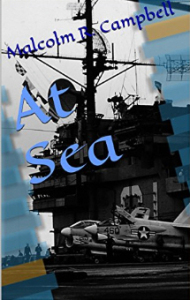 Malcolm R. Campbell is the author of the Vietnam War novel At Sea.
Malcolm R. Campbell is the author of the Vietnam War novel At Sea.
August 28, 2022
Sunday’s medley (or possibly hash)
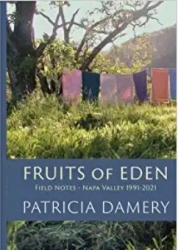 I’m happy to see that one of my favorite authors, Patricia Damery (Snakes, Goatsong) has a new book out, Fruits of Eden, about her ranch in Napa Valley and her fight against overdevelopment and bad stewardship of land and water. This richly illustrated book comes with color photographs, but it is also available in a money-saving black and white version here.My wife and I have discovered an important truth about health. (You might want to write this down.) When two people live in a house, the sick one will start getting well at the same moment the well one starts getting sick. This provides a time when both people are out of it.
I’m happy to see that one of my favorite authors, Patricia Damery (Snakes, Goatsong) has a new book out, Fruits of Eden, about her ranch in Napa Valley and her fight against overdevelopment and bad stewardship of land and water. This richly illustrated book comes with color photographs, but it is also available in a money-saving black and white version here.My wife and I have discovered an important truth about health. (You might want to write this down.) When two people live in a house, the sick one will start getting well at the same moment the well one starts getting sick. This provides a time when both people are out of it.
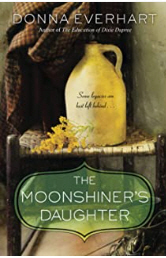 Since I enjoyed Donna Everhart’s The Saints of Swallow Hill, I’m trying another of her novels The Moonshiner’s Daughter. Plenty of grit in this one, too. It’s a little like “Thunder Road” without Robert Mitchum. (Don’t write that down.)As a writer, I often wonder how other writers kill people–er, in their novels. Sometimes a busload of nuns blows up and if any of them have names at all in the narrative it’s unusual since they are often presented to readers as a group and mourned together. It’s more difficult when a major character dies. I finally know how it’s going to happen in the work in progress, but I’m avoiding writing the words. Until I write down what happens, it hasn’t happened.
Since I enjoyed Donna Everhart’s The Saints of Swallow Hill, I’m trying another of her novels The Moonshiner’s Daughter. Plenty of grit in this one, too. It’s a little like “Thunder Road” without Robert Mitchum. (Don’t write that down.)As a writer, I often wonder how other writers kill people–er, in their novels. Sometimes a busload of nuns blows up and if any of them have names at all in the narrative it’s unusual since they are often presented to readers as a group and mourned together. It’s more difficult when a major character dies. I finally know how it’s going to happen in the work in progress, but I’m avoiding writing the words. Until I write down what happens, it hasn’t happened. Well, now that he was attacked by a coward, Salman Rushie’s name is showing up in op-ed pieces about getting a Nobel Prize. I think it should have happened already. One writer said Rushdie deserves the prize because he’s been a long-time proponent of our freedom to write. I applaud his stance–and his involvement with PEN America–but believe the prize should be based on the quality of his books, especially when his work is looked at over time.
Well, now that he was attacked by a coward, Salman Rushie’s name is showing up in op-ed pieces about getting a Nobel Prize. I think it should have happened already. One writer said Rushdie deserves the prize because he’s been a long-time proponent of our freedom to write. I applaud his stance–and his involvement with PEN America–but believe the prize should be based on the quality of his books, especially when his work is looked at over time.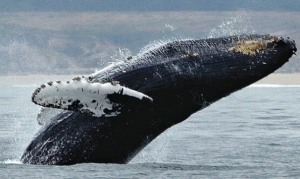 I like this story in the Christian Science Monitor:
“Speaking whale? Scientists are working on it.”
Our lack of better communication with other animals always makes me sad because I think we are missing out on a rich body of knowledge and the opportunity for more loving and productive interactions. I think it’s probable that the voices of the creatures of the deep are saying more than “So long and thanks for all the fish.”
I like this story in the Christian Science Monitor:
“Speaking whale? Scientists are working on it.”
Our lack of better communication with other animals always makes me sad because I think we are missing out on a rich body of knowledge and the opportunity for more loving and productive interactions. I think it’s probable that the voices of the creatures of the deep are saying more than “So long and thanks for all the fish.”
August 26, 2022
Review: ‘The Saints of Swallow Hill,’ by Donna Everhart
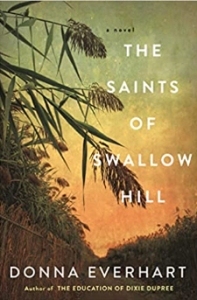 This novel turned out to be an excellent medication for a person who spent the past week with the flu and probably would also make for good reading for anyone else who likes a gritty story set in a depression-era turpentine camp in Georgia. The characters, some of whom are broken, some who are mean, some with mistakes on their résumés, some who take risks to help others, and some who would be nice to have as neighbors grow and become multidimensional as the story proceeds.
This novel turned out to be an excellent medication for a person who spent the past week with the flu and probably would also make for good reading for anyone else who likes a gritty story set in a depression-era turpentine camp in Georgia. The characters, some of whom are broken, some who are mean, some with mistakes on their résumés, some who take risks to help others, and some who would be nice to have as neighbors grow and become multidimensional as the story proceeds.
The story brings readers a realistic view of a turpentine camp as many of us know it from coming of age in a world of longleaf pines and many cat-faced trees and many stories about the harsh realities of the naval stores business at its most basic level. The story is one of those where readers are likely to fear for the characters and whether or not they will make it to the end of the book.
From the PublisherWhere the Crawdads Sing meets The Four Winds as award-winning author Donna Everhart’s latest novel immerses readers in its unique setting—the turpentine camps and pine forests of the American South during the Great Depression. This captivating story of friendship, survival and three vagabonds’ intersecting lives will stay with readers long after turning the final page.
It takes courage to save yourself…
In the dense pine forests of North Carolina, turpentiners labor, hacking into tree trunks to draw out the sticky sap that gives the Tar Heel State its nickname, and hauling the resin to stills to be refined. Among them is Rae Lynn Cobb and her husband, Warren, who run a small turpentine farm together.
Though the work is hard and often dangerous, Rae Lynn, who spent her childhood in an orphanage, is thankful for it–and for her kind if careless husband. When Warren falls victim to his own negligence, Rae Lynn undertakes a desperate act of mercy. To keep herself from jail, she disguises herself as a man named “Ray” and heads to the only place she can think of that might offer anonymity–a turpentine camp in Georgia named Swallow Hill.
Swallow Hill is no easy haven. The camp is isolated and squalid, and commissary owner Otis Riddle takes out his frustrations on his browbeaten wife, Cornelia. Although Rae Lynn works tirelessly, she becomes a target for Crow, the ever-watchful woods rider who checks each laborer’s tally. Delwood Reese, who’s come to Swallow Hill hoping for his own redemption, offers “Ray” a small measure of protection and is determined to improve their conditions. As Rae Lynn forges a deeper friendship with both Del and Cornelia, she begins to envision a path out of the camp. But she will have to come to terms with her past, with all its pain and beauty, before she can open herself to a new life and seize the chance to begin again.
For those who didn’t grow up in longleaf pine country, the author’s note provides a few helpful details about the workings of the turpentine camps.
This is a captivating, well-written story.
–Malcolm
August 21, 2022
Sunday’s potpourri
 Coming soon from Robert Hays and Thomas-Jacob Publishing, An Empty House by the River: “Lacy, who sees beauty wherever she looks and expects others to be as good as she is, can no longer count on her big brother to protect her from an abusive husband, and the family learns a hard truth: No one is immune to the quirks of fate, be they blessings or tragedies, and the river takes more than it gives.” Hays is also the author of A Shallow River of Mercy.I have a good case of the flu or the flue (not sure which) that isn’t being made better by the daily rain storms.
Coming soon from Robert Hays and Thomas-Jacob Publishing, An Empty House by the River: “Lacy, who sees beauty wherever she looks and expects others to be as good as she is, can no longer count on her big brother to protect her from an abusive husband, and the family learns a hard truth: No one is immune to the quirks of fate, be they blessings or tragedies, and the river takes more than it gives.” Hays is also the author of A Shallow River of Mercy.I have a good case of the flu or the flue (not sure which) that isn’t being made better by the daily rain storms.
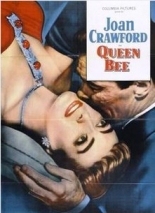 Best I can tell, this typical Joan Crawford film that we watched last night didn’t improve my health either. Where are all the happy movies when you need them, stuff like The Exorcist or Juliet of the Spirits or Cape Fear?Plus, the cats chose last night to squabble over which of them got to lie where in the bed. Chances are good that if you’re waked up at 4 a.m. with those kinds of shenanigans, you’re not going to get a good night’s sleep. And I didn’t! Got up at 6 a.m., had two sausage biscuits, and fell asleep on the couch for two hours. When I woke up, one of the cats was lying on top of me.
Best I can tell, this typical Joan Crawford film that we watched last night didn’t improve my health either. Where are all the happy movies when you need them, stuff like The Exorcist or Juliet of the Spirits or Cape Fear?Plus, the cats chose last night to squabble over which of them got to lie where in the bed. Chances are good that if you’re waked up at 4 a.m. with those kinds of shenanigans, you’re not going to get a good night’s sleep. And I didn’t! Got up at 6 a.m., had two sausage biscuits, and fell asleep on the couch for two hours. When I woke up, one of the cats was lying on top of me. We watch a few programs on HGTV. (Don’t quote me on this.) Everyone wants an open concept floorplan these days, you know, where the main floor’s about the size of a gymnasium that’s bigger than our house–including the yard. People want stuff to “flow.” Those who do the family’s cooking want to be able to see what their children and/or guests are doing while they (the cooks) are burning stuff in the oven. Ten years from now, homeowners will be hiring contractors to add a few walls and a little privacy. I guess if you can afford a house that costs $2 million, you can waste that money however you want.
We watch a few programs on HGTV. (Don’t quote me on this.) Everyone wants an open concept floorplan these days, you know, where the main floor’s about the size of a gymnasium that’s bigger than our house–including the yard. People want stuff to “flow.” Those who do the family’s cooking want to be able to see what their children and/or guests are doing while they (the cooks) are burning stuff in the oven. Ten years from now, homeowners will be hiring contractors to add a few walls and a little privacy. I guess if you can afford a house that costs $2 million, you can waste that money however you want.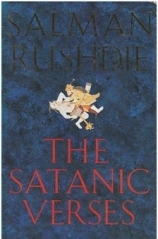 I read
The Satanic Verses
as soon as I could get my hands on a copy. I thought it was a hoot. The book’s in the news again after the cowardly attack on Rushdie. A lot of commentators say it’s dangerous. Is it? I don’t think so even if it offends some people. But if it is dangerous, that’s good because people need to be shaken up enough to question why they believe what they believe and why they’re angry when others don’t agree with them.
I read
The Satanic Verses
as soon as I could get my hands on a copy. I thought it was a hoot. The book’s in the news again after the cowardly attack on Rushdie. A lot of commentators say it’s dangerous. Is it? I don’t think so even if it offends some people. But if it is dangerous, that’s good because people need to be shaken up enough to question why they believe what they believe and why they’re angry when others don’t agree with them.
August 20, 2022
Has anyone tried this new age experiment?
S ystems of new age and/or old wisdom often include exercises designed to enhance one’s imagination, “see” things at a distance and determine diseases and other problems others may be suffering.
ystems of new age and/or old wisdom often include exercises designed to enhance one’s imagination, “see” things at a distance and determine diseases and other problems others may be suffering.
These experiments always represent a practical application of the day’s lesson inasmuch as true understanding and mastery require more than reading about a technique or method.
I’ve seen a lot of these experiments over the years and have enjoyed both the successes and failures of following the recipes. However, I balked at one of them, one in a book I read in junior high school with a title I no longer remember. I started out several times and always stopped, not because I thought it wouldn’t work, but because I thought it would. I’ve never had the courage to go back to it.
Basically, you’re supposed to sit in a chair in a room at one end of your house, calm yourself, and then get up and walk to the other end of your house, turn around, and go back to the chair.
Next, you imagine doing that, thinking of everything–doors, shelves, furniture–you see en route. Pretend to walk from one end of the house to the other and return to the chair.
Then do it physically. Then do it in your imagination. If you do this long enough, you will supposedly return to the chair and find yourself already sitting there.
It’s a good experiment, I think, but I never could face the possibility that it might work. Something just bothered me about that. What about you? Have you seen this experiment? If so, have you tried it.
I’ll be curious to hear your results.
August 19, 2022
‘The Templar Revelation’ by Picknett and Prince
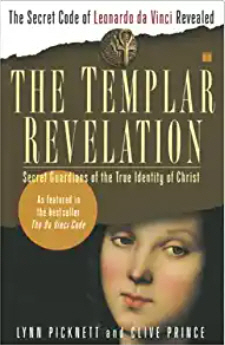 I’m re-reading this book because, like a mountain, it was there. (Amazon’s page listing reminds me that I bought it in 2004, seven years after it was released.) “There” in this case means that the book was sitting on my bookshelf in plain view when I put my feet up on my desk and wondered what to read next after finishing the Travis McGee thriller. McGee and the Knights Templar have very little in common, so my reading trend of late has more to do with having nothing new in the house than it does with a consistent, well-managed approach to reading.
I’m re-reading this book because, like a mountain, it was there. (Amazon’s page listing reminds me that I bought it in 2004, seven years after it was released.) “There” in this case means that the book was sitting on my bookshelf in plain view when I put my feet up on my desk and wondered what to read next after finishing the Travis McGee thriller. McGee and the Knights Templar have very little in common, so my reading trend of late has more to do with having nothing new in the house than it does with a consistent, well-managed approach to reading.
Unlike MacDonald’s The Dreadful Lemon Sky, this book promises “The secret code of Leonardo de Vinci Revealed” and that I will learn about the “Secret guardians of the true identity of Christ.” Good Lord, I’m thinking, there appear to be conspiracy theories higher than Mt. Everest when it comes to that old-time religion. A lot of people were wondering about that old-time religion when this book came out since Holy Blood, Holy Grail (1982) found a diverse audience and Dan Brown’s The Da Vinci Code was about to hit the fan in 2003.
I thrive off this kind of stuff, not because I pay much attention to the daily conspiracy theories coming out of Washington, but because–to my ministers’ displeasue–I’ve always had a lot of questions about the politics behind the Bible’s selection of books and about the “stuff” that seems to be missing from Sunday school class and vacation Bible school. In those days, I was seen as disruptive. Now, other than an occasional post on this blog, I don’t say much about religion. As Salman Rushie found out, saying things about religion isn’t safe.
Religion, it seems to be, has created one hell of a mess throughout the world when you consider wars found over it, people burnt at the stake because of it, and books banned from libraries because the town’s rulers believe stuff that doesn’t fit their kids’ available fiction. So, I’m not about to put a sign in my yard that says Mary Magdalene was Jesus’s wife. I think she was, but in our neighborhood, it’s much safer to put up a “John 3.16” sign than anything more inflammatory. Years ago, the signs would have said “Impeach Earl Warren.”
I’m enjoying re-reading The Templar Revelation because it contains the kind of subject matter that it’s not safe to talk about. No, I don’t believe it lock, stock, and barrel, but I like being free to consider the evidence in the privacy of my home since I’m not really free to say it on Facebook or in a letter to the editor of my daily newspaper. Freedom of speech and freedom of religion seem to be controlled by the crazy people with basements full of guns.
August 17, 2022
Travis McGee, 48 years after the release date
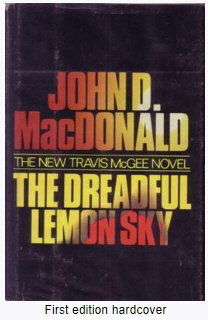 If you were reading light-weight thrillers between 1964 and 1985, you might have had John D. MacDonald’s Travis McGee novels on your nightstand. He wrote 21 of them, each with a color in its title. I wasn’t reading about Travis McGee 48 years ago because I preferred the novels MacDonald wrote before McGee came along in his old houseboat called the Busted Flush (won in a poker game). The series is similar in depth to the late Stuart Woods’ Stone Barrington novels, though Barrington and McGee are very different personalities.
If you were reading light-weight thrillers between 1964 and 1985, you might have had John D. MacDonald’s Travis McGee novels on your nightstand. He wrote 21 of them, each with a color in its title. I wasn’t reading about Travis McGee 48 years ago because I preferred the novels MacDonald wrote before McGee came along in his old houseboat called the Busted Flush (won in a poker game). The series is similar in depth to the late Stuart Woods’ Stone Barrington novels, though Barrington and McGee are very different personalities.
Nonetheless, McGee novels–told in the first person–had a lot of healthy snark, and many great turns of phrase that would work as the narrator’s voice-over in a noir movie. My favorite MacDonald novel was, in fact, used as the basis for my favorite neo-noir movie. His 1957 novel The Executioners was the basis for “Cape Fear” (1962). (Forget the 1991 remake that was more violent and less true to the novel.)
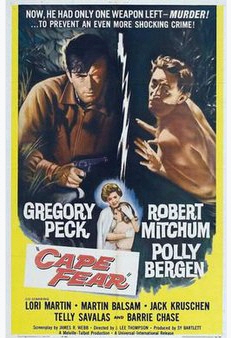 I’m among those who believe MacDonald turned out better stuff before he created Travis McGee even though he was probably better known for his Florida-based salvage consultant tho recovered lost property for a fee. In many ways, McGee is similar to Robert Galbraith’s Cormoran Strike character who uses old-fashioned detective methods rather than computers to solve crimes Both Strike and McGee interview people and follow up leads.
I’m among those who believe MacDonald turned out better stuff before he created Travis McGee even though he was probably better known for his Florida-based salvage consultant tho recovered lost property for a fee. In many ways, McGee is similar to Robert Galbraith’s Cormoran Strike character who uses old-fashioned detective methods rather than computers to solve crimes Both Strike and McGee interview people and follow up leads.
I suppose my taste leans too much toward noir books and movies that I stayed away from the McGee series until my brother Barry and his wife Mary visited us several days ago and he lent me a copy of The Dreadful Lemon Sky. Since I’m out of factory-fresh news novels, I decided to read it. I feel like a time machine has taken me back 48 years because the novel is anchored in the time in which it was written and–other than Strike–doesn’t fit into the detective genre as we find it today.
If you like told thriller novels, the colorful McGee series titles might be an interesting change of pace. Yet, I have a feeling that reading this one is an anomaly in the space-time continuum and that I won’t be heading out to Amazon to buy any more of them when I reach the end. Nonetheless, it’s held my attention.




